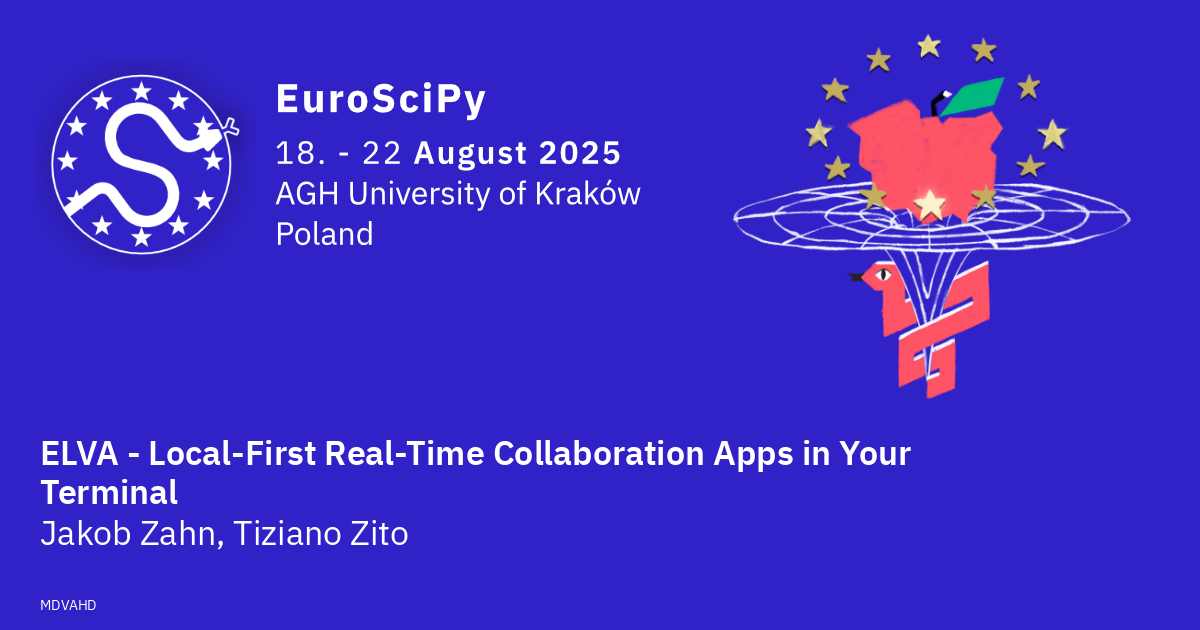ELVA - Local-First Real-Time Collaboration Apps in Your Terminal
Jakob Zahn, Tiziano Zito
Our Motivation
As scientists working with distributed groups all over the world, we have high and numerous expectations for a digital collaboration tool:
- platform-independent
- secure
- reliable synchronization of any kind of data
- works seamlessly offline
- private, no remote cloud services involved
- no central servers required, peer-to-peer
- access to the local filesystem
- easily adaptable and extensible
- easily accessible
- stable and lightweight
- open-source
Several tools already exist that can fulfill a subset of these requirements, but they come with all sort of restrictions.
Some examples:
- Git is great for keeping track of text files, but it requires you to manually save the current state by committing and lacks efficient native support for binary files. Also, the user has to manually deal with merge conflicts when multiple people work on the same files. While powerful extensions such as Git-LFS and git-annex do a great job with binary data, Git is still unsuitable as general purpose collaboration platform.
- Cloud-based software such as Nextcloud, Seafile or the corresponding commercial alternatives are able to sync any type of data out of the box, but they implement versioning only in a rudimentary fashion, if at all. Furthermore, a central server is a vital part of the architecture. Since their synchronization is file-based, merge conflicts still arise and need to be resolved by hand.
- Browser-based editors like Visual Studio Code, HedgeDoc or Etherpad feature real-time synchronization of content, but cannot sync binary data, and when they are implemented as in-browser apps, they cannot always access the local filesystem.
ELVA aims to close these gaps.
Our Ideas
In short, we want to have the comfortable real-time synchronization of in-browser apps but in a software that runs locally for proper access to the filesystem on every operating system.
Conflict-free replicating data types (CRDTs) are the backbone of ELVA.
They provide the fundamental logic for proper integration of shared data fragments.
The suite shall be written in Python, as it is relatively easy to learn and widely used in scientific research.
If users of ELVA feel the need for special functionality, they should be able to add it by themselves without much effort.
Also, as we intend ELVA to be also usable by non-technical people, we need to have a good user interface (UI).
We decided to settle on text-based terminal apps, which are lightweight and work consistently across platforms, but graphical interfaces are likewise implementable.
Versioning could still be realized with a Git integration and synchronizing bulk storage is a question of app and protocol design.
Our Prototype
We are proud to present our prototype of ELVA with a working text editor and a chat app.
Currently, we use the pycrdt package providing Python bindings to the Yrs library, which holds the Rust implementation of CRDTs originating from the Yjs library.
Yjs is used in a variety of popular software: JupyterLab, Facebook's Lexical editor, Nextcloud and many other projects.
The text-UI is powered by the Textual framework.
We intentionally kept the UI minimal to also allow pure keyboard usage.
A builtin REPL widget provides the needed configuration flexibility.
The project's design concept stands: We provide apps to be directly used and library code for writing own features and apps. The configuration specification as well as the synchronization protocol are also defined.
We publish comprehensive documentation under https://elva.mintgruen.tu-berlin.de alongside a few guides and a blog. Code management with versioning and changelog has been properly set up for ease in long-term maintenance.
The source code of ELVA is published under the AGPL-3.0 license on https://github.com/innocampus/elva.
Our Vision
We hope to build up a community around this project by showing it to and improving it with other people.
As a part of that, we plan to introduce ELVA to our students in programming classes.
A dedicated app for bulk synchronization is being developed.
Additionally, we would like to explore networking without a central server and implement easy to setup peer-to-peer communication protocols to also allow for
spontaneous collaboration in meetings or at conferences.
Other apps and integrations might be written in other languages than Python thanks to ELVA's integrated networking and the Yrs bindings available in several other languages.
Another important point is integrating Git into ELVA for proper versioning and publishing with services such as GIN.
Contact Information
Jakob Zahn
Head of Software Development
Projekt ELVA
Pronouns: he/his
Address: Mr.
Technische Universität Berlin innoCampus Room E116 Einsteinufer 19 10587 Berlin Germany
Phone: +49 30 314 77006 Mobile: +49 152 06370569 E-Mail: jakob.zahn@tu-berlin.de
